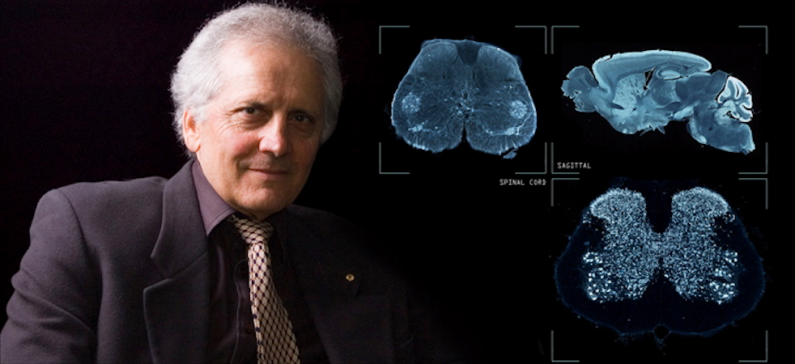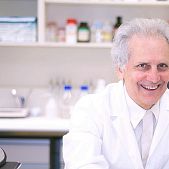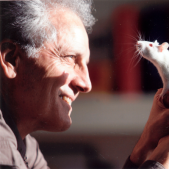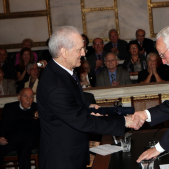Your scientific pursuit drove you away from Greece. For what reason? Do scientists believe that there is no space available for them in Greece?
In 1963, the year I left Greece, I believed that I couldn’t make it through university, as we were ill-informed in the countryside, Ithaca, where I was living, so I didn’t even try to take the exams. I thought I would fail. As my brother was already living in the US and I was actually given the opportunity to leave, I relocated to the US to study. However, I do not complain about the education I received in high school, as I didn’t meet people better educated than me in the United States. We were well educated, but we were ill-informed.
What do you think about education and academic institutions in Greece?
I believe there are good elements in Greece, but tools are fewer than minimum standards and though many may call me heretic, I must say that Greece has to consider how Australia has dealt with the same issue and profitably funded universities. Who’s languishing after all when the university lacks the resources to buy equipment and pay for the professors’ salaries reinforcing the competitive advantage of the institution, as a good professor often chooses the institution offering him more money? Students could pay for their tuition and pay it off when they eventually get the average salary valid in Greece. That’s what Australia chose to establish and currently people are not complaining.
Please, elaborate on your work. You’re popular as the man that mapped the human brain, the Brain Magellan.
I design maps and atlases of the brains of laboratory animals and humans. I discover what’s happening in the animals’ brain locations and then match it with the same locations in the human brain. Moreover, I look for the existence of the same locations in humans and eventually our laboratory assists scientists that look for the cause or cure of diseases constructing disease models in laboratory animals, like the Alzheimer’s and Parkinson’s disease, epilepsy, depression, schizophrenia and many more. Based on their models, they are well equipped in order to use drugs that can fight off the disease and later test the drugs’ effects on humans. These scientists demand to know the rat’s brain locations in detail and then relate the information to the human brain. That’s exactly what we deliver. We deliver maps, like a road map of Athens that guides the users to different directions and correct locations.
When did you realize your calling to tangle with medicine and the human brain?
At the beginning, I wanted to be a high school professor, but after realizing that people around me were no better than me, I decided to go a bit further. I followed my post graduate studies at the University of California at Berkeley, McGill University and Yale University taking one step at a time. As long as I could make progress, I kept moving on. At first, I studied psychology because I thought it was interesting and I still do. However, when I was at Cambridge University, I happened to notice a brain staining more discernible that what I had experienced in the past and I presumed that I could design an atlas of the rat’s brain, given the fact that most scientists work rather on the rat’s than on the human’s brain, and so I designed a more accurate brain map of the rat. I did it successfully but not effortlessly. We faced difficulties in finding a publisher. We were told that the world didn’t ask for another atlas of the rat’s brain. Eventually, we found a publisher in Australia and managed to publish our work. I followed my nose! As long as things were moving, I moved along. The human brain’s structure and relations with animals is an interesting field and what’s attracting us the most is to spot a brain location still unidentified by science. In this case, we have the right to name it and we picked Greek names on similar occasions in the past.
You were recently welcome to the Academy of Athens, weren’t you?
I received the distinction of playing first the bouzouki at the Academy of Athens. I played the tune of Moon, you put a spell on me, after admitting that I felt like playing a tune that reflects my life. So, bouzouki playing sounded at the Academy.
Do you believe that Greeks will consistently provide for science in the future?
I’m not so hopeful Greeks will manage to offer more than what is currently offered. I believe that the Kapodistrian University of Athens ranks among the best 200 universities of the world, not among the best 10, nor 50, nor 100.
You were born on the island of Ithaca. What’s your current relation to the island? Do you visit often?
Yes, I do visit Ithaca often. I like the island. As each and every one of us thinks that his own mother is his favourite even if she’s not the most beautiful. It’s a green island and I like that. Ithaca’s beaches are wonderful and not overcrowded during summer. The only thing I despise is driving in Ithaca. I feel that there are two kinds of drivers, the terrorists and the terrified. I’m one of the terrified!
What does Greece mean to you?
Greece means friendship. What I can easily make rather here than abroad is a friend. I can feel love and affection better here than abroad. I’m also touched by the sense of carrying when you’re in need and people do their best to help you. Greeks are compassionate. Moreover, I like the Greek music and the language. In the past, I have written one or two poems myself. I cannot write poems in English.
What do you think about the financial crisis in the country?
I follow the daily news. I traveled to Greece once, only to vote against the two parties that brought Greece down to its knees. I witnessed the end of 1940 and the years after the war. I can recall the civil war and though we were in a bad situation, we were all equal. You didn’t feel that someone embezzled your money or the state’s property. I dislike the fact that they are not punished or asked to give back the money, when other countries have successfully concluded this process based on various lists of deposits abroad. In Greece, we haven’t accomplished it yet, spreading a feeling of injustice.
Do you believe that Greeks will manage to survive thanks to their temperament?
As a scientist of medicine, I can only see one thing that no one has mentioned before. I see that Greek people can afford buying cigarettes worth €4.9 million per year. Moreover, I see that a pack of cigarettes costs €4-5 in Greece and €14 in Australia. The smokers infringe on the non-smokers’ right of freedom by forcing them to pay the bill. The cost of smoking and traffic accidents in Greece is estimated at €25 billion per year! When calculated by 20 years, the amount overruns the amount of debt. We shall reconsider the aspects of freedom that citizens consider obvious. You’re free to smoke like a chimney, but pay for it! Even if a pack of cigarettes costs €30!
What is your top question to Greeks?
Why pedestrians in Athens and other cities don’t rebel against the dynasty of cars?













Ioanis Komninos
-29/09/2016 8:33 am
I’m afraid, prof. Paxinos has fallen into the trap that many scientist had fallen before him and many will after him. While his scientific work in neuroscience is very substantial, he felt that it gives him enough base to endeavor into ontology, metaphysics and theology. Trying to dismiss reality, such as the human soul (see his most recent article at “theconversation.com”), using whatever knowledge we, as humans, have on the brain and nervous system is childish and typical of the western intellectual tradition as defined since the 8th century AD in modern-day western Europe. His arguments become hypotheses, at best, and his approach erroneous and contradictory. Whether humans have a soul or not is a matter for debate as much as the existence of bacteria is: countless scientists have known for many years that bacteria exist, and countless saints (and others) know that humans have a soul. People, like prof. Paxinos, prefers to believe some people’s experience of reality (i.e., scientists) selectively. I guess, seeing is believing so he will have to wait until his death to find out about the human soul; however, it would be immensely better for him to find that out much sooner. That is, if he is interested.
Martin kitay
-21/05/2022 12:14 pm
My wife died 2 yrs ago from Alzheimers age of 64 I remarried my step grand son Joah age 12 yers was diagnosed with Rasmussen encephalitis 3 yrs ago Maybe you are able to advise us with aetiology of the disease and anything you can help with. Most of his left cerebral hemispheres is damaged. Sincerely Martin